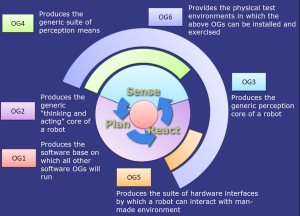The overall challenge of this strategic research cluster (SRC) is to enable major advances in space robotic technologies for future on-orbit missions (robotics and proximity rendezvous), and the exploration of the surfaces of the other bodies in our solar system.
Each Strategic Research Cluster (SRC) is divided in two categories: Programme Support Activity (PSA) which main role is to elaborate a roadmap for the whole SRC, and the Operational Grants (OGs), intended to address different development steps identified in the roadmap.
In the PERASPERA project, the Space Robotics Technologies PSA, has produced a roadmap with 3 different tracks (common building blocks, orbital and planetary) to be completed from 2016 until 2024.
These first call of the SRC includes six Operational Grants defined for the common building blocks in the 2016 call are illustrated in Figure 1‑1.. Here below are listed the topics and projects:

Overview of the integration of the different OGs
OG 1. Space Robot Control Operating System: ESROCOS
OG 2. Autonomy Framework Time/Space/Resources planning and scheduling: ERGO
OG 3. Common Data Fusion Framework: INFUSE
OG 4. Inspection Sensor Suite: I3DS
OG 5. Modular Interfaces for Robotic handling of payloads: SIROM
OG 6. Validation Platforms and Test Fields: FACILITATORS
The SRC’s first activities have focused on the design, manufacture and testing of five common robotic-building blocks for space-based operations. In the last and most challenging phases of this first cluster call, these technology blocks have been tested in representative environments to serve as the basis for future orbital and planetary robotics missions.
The second phase of the Space Robotics Technologies SRC has the specific purpose is to integrate the common technology building blocks previously prepared in ground demonstrators, contributing to the development of space-robotics applications in the field of orbital and planetary use (phase 0/A studies).
The applications and activities selected for the second call contain enabling elements for enhancing and fostering commercialisation of space considering aspects of New Space and Industry 4.0.
The SRC Operational Grants (OGs 7-11) of this second call adress the following topics:
OG 7. Application: Orbital Support Service
OG 8. Application: Robotised Assembly Of Large Modular Orbital Structure
OG 9. Application: Robotised Reconfiguration Of Satellites
OG 10. Application: Autonomous Decision Making in very long traverses
OG 11. Application: Exploring Robot-Robot Interaction (OG11) in planetary exploration and exploitation 10
ADE answers to the Operational Grant 10, and it is responsable of the central maintenance of OG2 ERGO framework.
The challenge of the OG10 is defined in the SRC Guidelines integrally recalled in the previous section of this proposal and here after summarized as to “to demonstrate the techniques needed to realize a planetary rover system with very long traverse capabilities (kilometres per sol) by independently taking the decisions required to progress, reduce risks and seize opportunities of data collection. The rover will be required to travel independently from a starting point (e.g. a lander) towards and end point (say a cache of sample), perform independent opportunistic science on the way and return to the lander with the acquired soil sample”
To fulfil this challenge and its associated requirements, as defined in the Master Plan and SRC Guidelines a number of objectives have been identified in the previous section and will be further elaborated
 AUTONOMOUS DECISION MAKING IN VERY LONG TRAVERSES (ADE)
AUTONOMOUS DECISION MAKING IN VERY LONG TRAVERSES (ADE) 